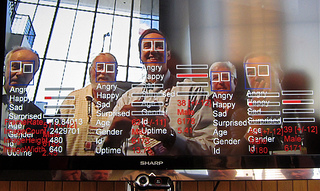Facial recognition OK, bar Facebook: survey

Australians generally accept the value of facial-recognition technology for security purposes, but when applied to social media, only a minority accept its use.

(Fraunhofer Face Finder image by Steve Jurvetson, CC BY 2.0)
This conclusion came from research conducted by Unisys (PDF) as part of its annual Unisys Security Index (PDF), which involved a national survey of over 1200 adults. It found that only 38 per cent of respondents supported Facebook's use of facial-recognition technology to identify or tag friends in photographs, while 50 per cent outright opposed its role in social media. The remaining 12 per cent had not yet formed a view.
The technology itself isn't to blame, however, with the context in which it is used appearing to be the main factor of whether it is trusted. When used for airport customs or immigration staff to identify passengers on police watch lists, 95 per cent of respondents supported the use of facial recognition, and only 4 per cent opposed it.
Similarly, when it came to police combining facial-recognition technology with footage from security cameras or publicly submitted videos, 92 per cent supported its use, and just 6 per cent opposed it.
But support began to fall when the technology was used by in the workplace to help employers identify what parts of a building their staff had accessed. About 66 per cent supported facial recognition used in this way, while 29 per cent opposed it.
"The research findings clearly show that the Australian public's support for facial recognition technology is determined by the context within which it is used," said Unisys Asia Pacific security program director John Kendall.
"There is very strong support for facial-recognition technology, but only in circumstances that Australians deem to be appropriate, such as policing or protecting borders."
Kendall said that even though Australians support the technology, they only support its use when they know what benefits there are to gain, indicating that people are still not convinced of the benefits of automatically tagging friends in social networks.
"These results suggest that Australians are happy for new security technology to be used, but only when they can perceive a clear and substantive benefit for themselves and for the broader community. When that benefit is less clear, then the level of support starts to decline," Kendall said.
Other findings from Unisys' research indicate that Australian attitudes towards security have not changed in the past year. Data-privacy issues continue to remain the highest concerns among those surveyed, specifically relating to credit/debit card fraud and identity theft.